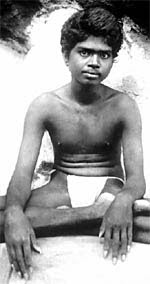ॐ OAM NAMO BHAGAVATE SRI RAMANAYA ॐ
Swarupa dhyana & Swarupa-darshnam
[ Self-Attention & Realisation of Self ]
“Although tendencies towards sense objects (vishayavasanas), which have been recurring down ages, rise in countless numbers like the waves of the ocean, they will all perish as Self-attention (Swarupa dhyana) becomes more and more intense. Without giving room even to the doubting thought, ‘Is it possible to destroy all these tendencies (vasanas) and to remain as Self alone?’, one should persistently cling fast to Self-attention. However greater a sinner one may be, if, not lamenting ‘Oh, I am a sinner! How can I attain Salvations?’ but completely giving up even the thought that one is a sinner, one is steadfast in Self-attention, one will surely be saved.
-- Sri Ramana Maharshi in Who am I?
“ If the mind, which is the cause (and base) of all knowledge (all objective knowledge) and all action, subsides, the perceptions of the world (jagatdrishti) will cease. Just as the knowledge of the rope, which is the base, will not be obtained unless the knowledge of the snake, the superimposition, goes, so the realization of the Self (Swarupa-darshnam), which is the base, will not be obtained unless the perception of the world (jagat-drishti), which is a superimpositions, ceases.
-- Sri Ramana Maharshi in Who am I?







